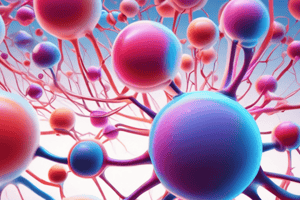Podcast
Questions and Answers
What does pathophysiology primarily deal with?
What does pathophysiology primarily deal with?
- Study of functional disturbances in diseased organisms (correct)
- Study of disease prevention techniques
- Study of healthy body functions
- Study of genetics
Which aspects of a disease are defined by pathophysiology?
Which aspects of a disease are defined by pathophysiology?
- Symptoms and signs
- Etiology, pathogenesis, morphology, and clinical significance (correct)
- Treatment options
- Epidemiology and risk factors
What does cellular adaptive response to injury refer to?
What does cellular adaptive response to injury refer to?
- Cells changing their structure in response to injury (correct)
- Cells dividing rapidly after injury
- Cells becoming resistant to injury
- Cells undergoing apoptosis immediately after injury
In the context of pathophysiology, what is necrosis?
In the context of pathophysiology, what is necrosis?
How does pathophysiology connect biomedical sciences with clinical subjects?
How does pathophysiology connect biomedical sciences with clinical subjects?
Why is pathophysiology considered important in health education?
Why is pathophysiology considered important in health education?
What is the outcome of mitochondrial swelling with formation of large amorphous densities in the matrix?
What is the outcome of mitochondrial swelling with formation of large amorphous densities in the matrix?
Which process involves leakage of proteolytic enzymes into the cytoplasm due to lysosomal membrane damage?
Which process involves leakage of proteolytic enzymes into the cytoplasm due to lysosomal membrane damage?
What nuclear changes can occur in cell injury and include pyknosis, karyorrhexis, and karyolysis?
What nuclear changes can occur in cell injury and include pyknosis, karyorrhexis, and karyolysis?
Which term describes a specialized form of programmed cell death that does not elicit an inflammatory response?
Which term describes a specialized form of programmed cell death that does not elicit an inflammatory response?
In apoptosis, how does the cell destroy itself?
In apoptosis, how does the cell destroy itself?
What event leads to necrosis as a pathological result of irreversible injury?
What event leads to necrosis as a pathological result of irreversible injury?
What is the mechanism of Hypoxic Cell Injury?
What is the mechanism of Hypoxic Cell Injury?
Which of the following is a consequence of reversible cell injury?
Which of the following is a consequence of reversible cell injury?
What is a characteristic of irreversible cell injury?
What is a characteristic of irreversible cell injury?
Which condition can lead to hypoxia due to decreased oxygen-carrying capacity?
Which condition can lead to hypoxia due to decreased oxygen-carrying capacity?
What is the consequence of decreased intracellular ATP?
What is the consequence of decreased intracellular ATP?
Which process occurs due to ischemia?
Which process occurs due to ischemia?
What is the purpose of apoptosis in the context provided?
What is the purpose of apoptosis in the context provided?
Which of the following is NOT a trigger for apoptosis?
Which of the following is NOT a trigger for apoptosis?
What are the morphological features of apoptosis as described in the text?
What are the morphological features of apoptosis as described in the text?
What defines necrosis according to the text?
What defines necrosis according to the text?
Which type of necrosis is most commonly associated with ischemic injury?
Which type of necrosis is most commonly associated with ischemic injury?
What does necrosis result from according to the text?
What does necrosis result from according to the text?
What is the principal adaptive response that involves an increase in the size of cells leading to an increase in the size of the organ?
What is the principal adaptive response that involves an increase in the size of cells leading to an increase in the size of the organ?
Which type of hypertrophy usually occurs in cells that are not capable of division or replication?
Which type of hypertrophy usually occurs in cells that are not capable of division or replication?
In response to increased demand by exercise, which type of adaptive response involving hypertrophy occurs in skeletal muscles?
In response to increased demand by exercise, which type of adaptive response involving hypertrophy occurs in skeletal muscles?
Which cell type undergoes hypertrophy in heart failure conditions like hypertension or aortic valve disease?
Which cell type undergoes hypertrophy in heart failure conditions like hypertension or aortic valve disease?
What is the outcome when cell injury is reversible and cells return to normal within certain limits?
What is the outcome when cell injury is reversible and cells return to normal within certain limits?
What is the term for a potentially reversible change in cell response to environmental stress?
What is the term for a potentially reversible change in cell response to environmental stress?




